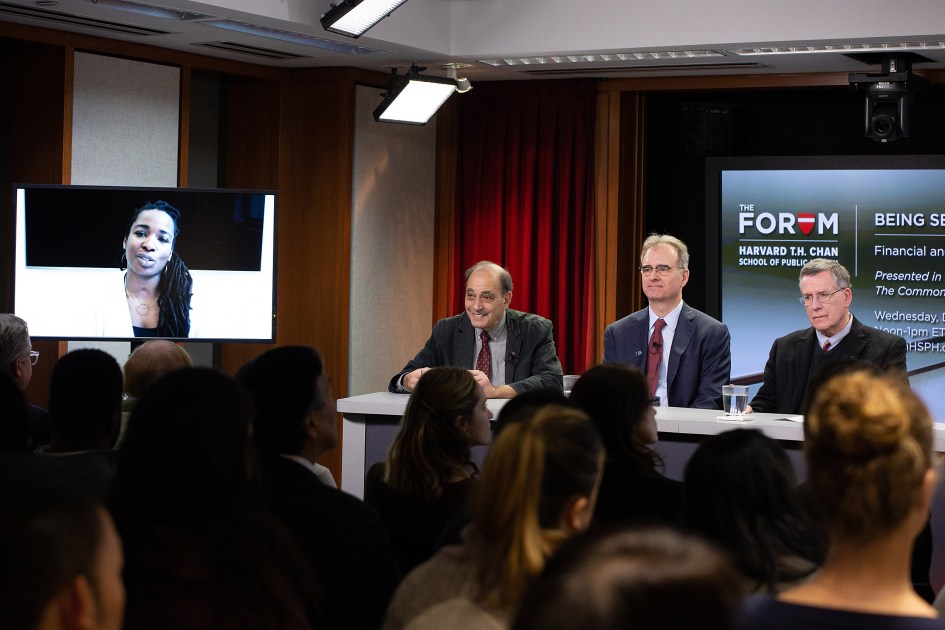
Despite the Affordable Care Act’s much-touted expansion of health coverage in the U.S., a first-ever poll of America’s seriously ill demonstrates that insurance alone isn’t enough to protect against the high cost of care.
The poll showed that though 91 percent of respondents had health insurance, 53 percent of those with insurance had trouble paying their medical bills.
“These are not stories about the uninsured, these are stories about people with an insurance card,” said Professor Robert Blendon, who discussed the poll Wednesday at the Harvard Chan School, which cooperated on the effort with The Commonwealth Fund and The New York Times.
“For 50 years in this country, we’ve been debating how to help people who aren’t insured. And the assumption is once you get them the card they are protected for the rest of their lives. [We live] in a world where seriously ill people with insurance, including Medicare, are facing staggering bills.”
More than a third of the seriously ill with insurance — 36 percent — used all or most of their savings to pay for care, 21 percent had trouble paying for basic necessities, and 28 percent lost or had to change jobs because of illness.
Financial consequences extend to family or friends who take on the role of caregiver once the patient comes home. Twenty-three percent of caregivers developed financial problems themselves, while 21 percent took an income hit due to their caregiver role. The poll, with a margin of error of 3.2 percent, surveyed 1,495 adults or caregivers of adults who faced serious illness in the last three years. It was conducted between July 6 and Aug. 21.
Along with Blendon, Richard L. Menschel Professor of Public Health, the webcast “Being Seriously Ill in the U.S.: Financial and Healthcare Impacts” included comments from Eric Schneider, senior vice president for policy and research at The Commonwealth Fund; Robert Master, founder, former president, and chief executive officer of the nonprofit health plan Commonwealth Care Alliance; and Toyin Ajayi, chief health officer and co-founder of Cityblock, a nonprofit that aims to transform care for underserved urban populations.
The survey also found room for improvement in quality of care. Nearly one in four respondents, 23 percent, reported a serious medical error, while 61 percent reported one or more problems involving poor care coordination, lack of clarity about services, or lack of responsiveness of staff.
Resolving these issues, Master and Ajayi said, goes beyond just focusing on mistake-free processes to both redesigning how we care for the seriously ill and better coordination across the system. One suggestion: a “guided care nurse” who follows a patient regardless of the setting, visiting him or her at home, in the hospital, and in longer-term settings.
Another change, Ajayi said, would be for doctors to ask patients about their finances. A seriously ill patient may be faced with a choice between food for his or her children or medication. It’s “tantamount to medical malpractice” to ignore financial constraints in designing a care plan, Ajayi said.
Home visits by clinicians can make a difference, panelists said. The visits help providers understand patients’ day-to-day lives and the trouble they may have complying with treatment. The group also emphasized home-based care, which is not only less expensive, but avoids the gaps in care that can occur when patients are transferred from facility to facility.
To help the seriously ill at home, Master suggested broader adoption of a Medicaid program that compensates family members for providing care. Government aid that helps home caregivers also helps the seriously ill stay at home, he noted, saving money by keeping them out of a nursing facility.
The current health care system seems to be optimized for the healthy 28-year-old, Ajayi said — the patient who has no trouble taking a few hours off work to come in for a primary care visit, and can afford copayments with little trouble. But we’re all just an accident or an unfortunate diagnosis away from joining the ranks of the seriously ill, Ajayi noted, making the case that reform aimed at better care for the seriously ill is in everyone’s interest.
Blendon pointed to the marketing of cheaper insurance plans to healthy people with the advice that they buy plans that meet their current needs. The problem with that rationale, he said, is that nobody knows when they’re going to get sick or injured, at which point a bargain-basement plan is inadequate.
Health insurance should anticipate dramatically changed needs, he said — for expensive but critical care the policy holder might require next week, next month, or 10 years from now, when serious illness strikes.
The Daily Gazette
Sign up for daily emails to get the latest Harvard news.
